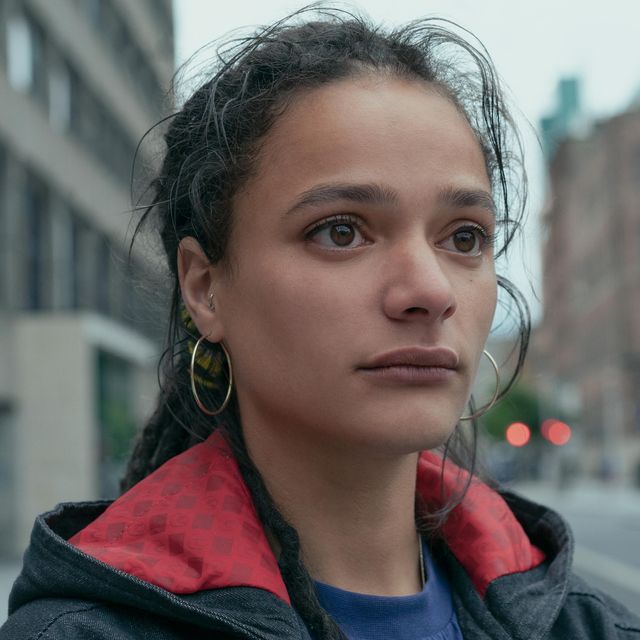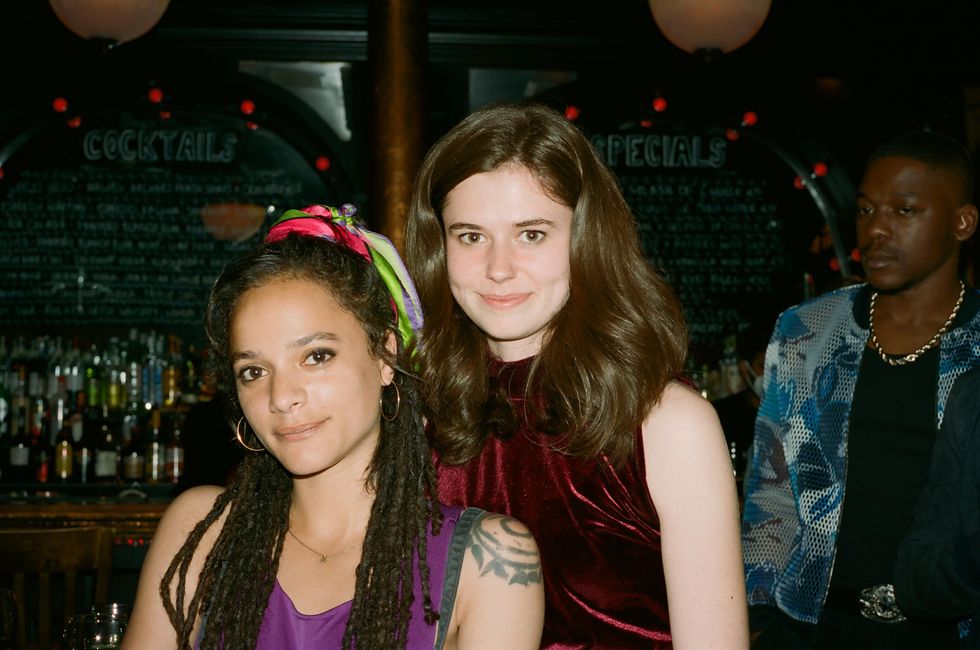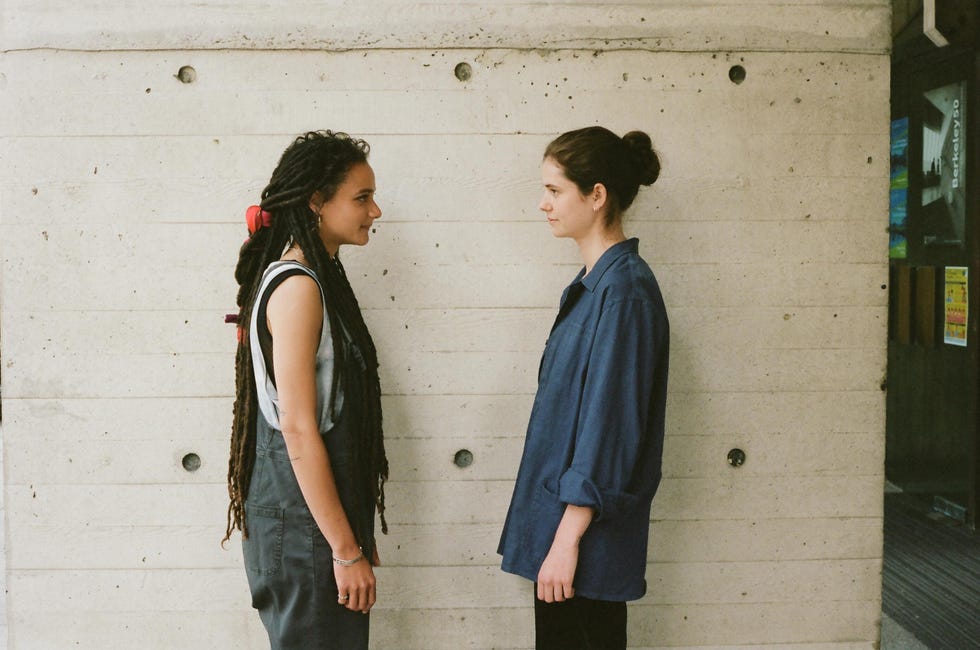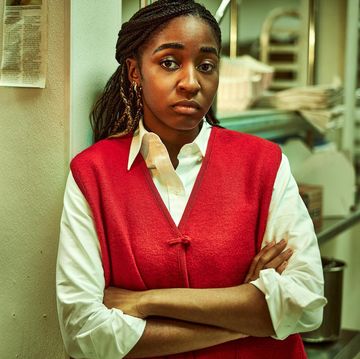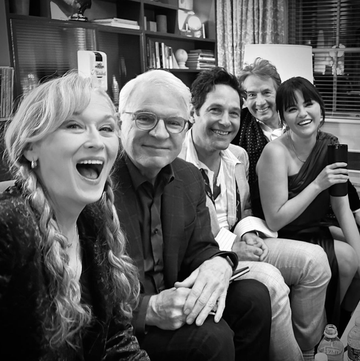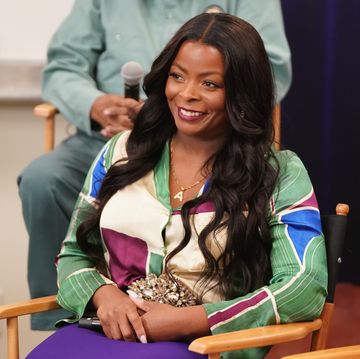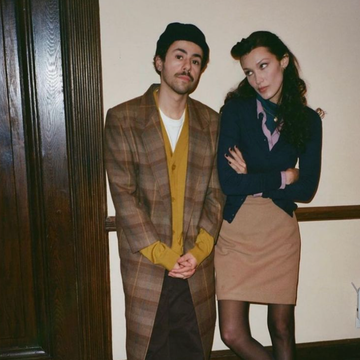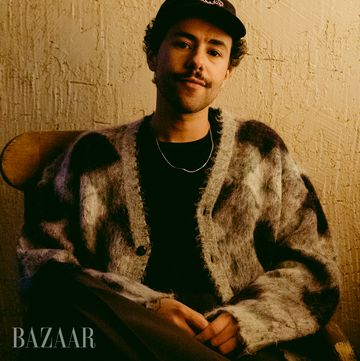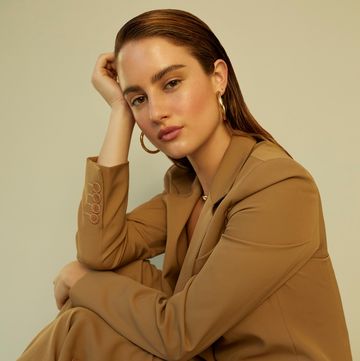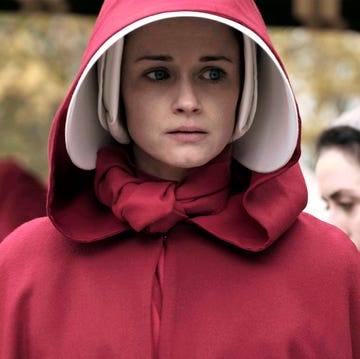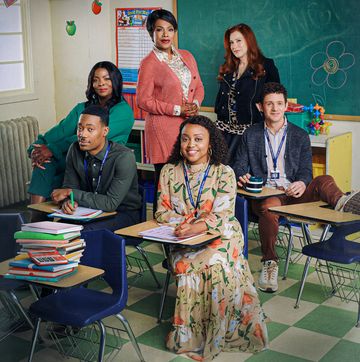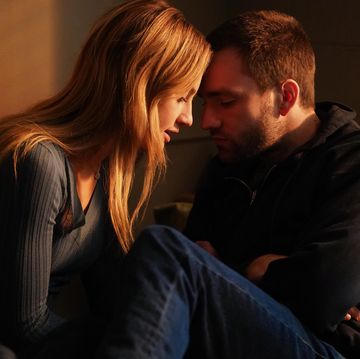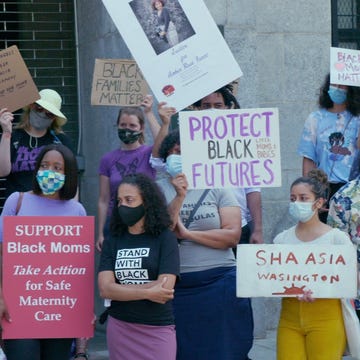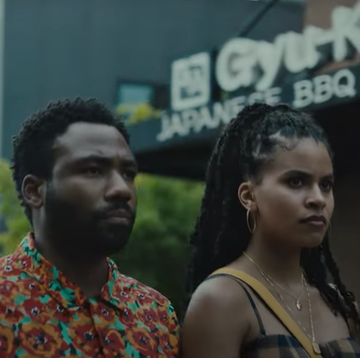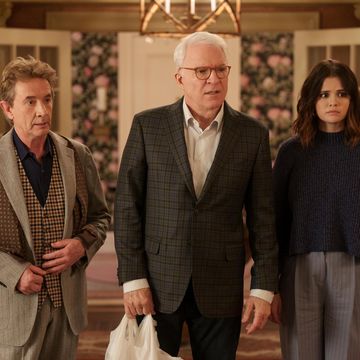The TV adaptation of Conversations with Friends leaves the plot of Sally Rooney's best-selling first novel mostly unaltered. Ex-girlfriends and best friends Bobbi and Frances meet married couple Melissa and Nick; Bobbi flirts with Melissa, while Frances and Nick strike up a full-blown affair; Bobbi and Frances's bond is tested by the mess they—well, mostly Frances—make.
On paper, Bobbi is the commanding half of the core relationship. She's the compelling and bold counterpart to the muted but observant Frances, and possesses what Frances calls a "ferocious and frightening power over circumstances and people." "Whatever she wanted, she could have," Frances narrates.
Onscreen, actress Sasha Lane portrays Bobbi in a way that modifies, if not outright challenges, book-Frances's sweeping generalizations. Bobbi is now the lone American in the series' Dublin academic circle, a change brought about by Lane auditioning for the role.
"In a weird way, it's because I'm the one playing the character. If I wasn't, it would be a different story," Lane tells BAZAAR.com over Zoom. She says altering Bobbi's identity adds new dimension to her character and maybe inspires sympathy for Bobbi's outspoken tendencies. "You can understand a bit more of why Bobbi is more like, 'I don't really care about your opinions.' Within this story, because it is Frances's world, Bobbi needs to be the outside perspective," she says.
Frances narrates Bobbi onto a pedestal in the book; Lane saw her role as bringing Bobbi back to earth, with softer edges and a more obvious vulnerability. With the chance to play Bobbi, Lane says, "I got excited, because I felt like I had this understanding that she was misjudged."
Ahead, Lane goes deep on what drew her to Conversations with Friends, how she and costar Alison Oliver brought Frances and Bobbi's relationship to life, and how she really feels about the series' ambiguous ending.
I want to start with the first time you read Conversations with Friends. What was your first impression of Bobbi, and what made you interested in playing her?
The first time I heard about Conversations with Friends was when I got the email for the audition. So I asked to get the book—it’s like the same as getting a script. I want to read before I do an audition. I read it within the day. I guess that goes to show that I really enjoyed it.
The thing about Bobbi was, on the first read, she’s one of those characters where it’s easy to hate her or judge her right off the bat. Even if you looked up the book or something, people are like, "Ugh, that Bobbi character!" But I got excited, because I felt like I had this understanding that she was misjudged. Especially because she was [shown] through one person’s perspective, and how one person sees and feels and hears the things you’re saying doesn’t necessarily mean they’re true.
I was getting excited to have scenes and a script where Bobbi’s point of view, what she’s taking in and what she’s putting out, are seen on a higher range. I wanted to add a sensitivity to her, to make her a little more likable, or to make a little more of an understanding of who she is, and not just the fact that she’s more blunt with her words and how she delivers her opinions.
Where do you think that new vulnerability comes through in the show?
There’s that moment when she’s telling Frances, "You’re thinking things and not saying them." It’s frustrating when you’re in a room with someone and they’re saying nothing and yet bringing out every emotion, and you’re just supposed to go with the flow of it and keep your mouth shut. I think Bobbi took time to respond, and I liked that about her. There’s also a key moment when Frances calls her jealous, and she’s like, "Okay. I’m not going to say what I want to say in this moment." And it’s nice, because you get to see the room and the space of it.
A lot of the chemistry and tension between Bobbi and Frances is established before the story begins, and the relationship deepens over the course of the show. How did you and Alison [Oliver, who plays Frances] work on building a rapport and dynamic that conveyed that sense of history?
We just spent a lot of time together. Ali is so precious. She’s so innocent and kindhearted, and I felt a need to protect her. I’m a mom now, too, and it just comes out of me where I’m like, "Your shoe is untied. And you need to tie that, because you’re going to trip and fall." That’s just naturally how we were.
She’s a bit more emotional, outwardly, and I’m more like, "I’m going to be thinking about you, but my face might not show it." I think that might help the dynamic, because it was Frances and Bobbi in a sense. Then we would have discussions of, "When do you think they broke up? Apart from what the book tells you, do you think that Bobbi still loves her?" I would be on FaceTime trying to make banana pudding sometimes, and we would just talk and talk.
Then, we had little discussions on set. If Leanne was directing a scene and she would come in and say, "I think you guys should hold hands," or something like that, after a certain time we knew, no, they wouldn’t. This isn’t one of those choice moments that they do that. They don't really show PDA in their friendship or their relationship. So as time moves on and that kind of sinks into your brain, you go into other scenes where you’re like, "Oh, no." Or, "We would do this."
I find the power dynamics in their friendship so interesting, and how they intersect with when and how Bobbi and Frances choose to share or withhold information for one another. We don't see Bobbi kiss Melissa onscreen, for example, but she tells Frances that it happened—all while Frances hides her relationship with Nick. I'm curious to hear your thoughts on whether the power dynamics shift, if at all, over the course of the series, and how you portrayed that.
For me, personally, I don’t feel like they shifted. Even though Bobbi may be the one who takes more initiative—going to the parties, meeting the people, ringing the freaking doorbell for Frances when it’s like, "Why am I even at this dinner party in the first place?"—Frances holds the ball, because Frances does not speak. The silent person is the one who holds the most power, because you’re constantly wondering, "What is she thinking? What is she feeling? If I make the wrong move, how is she going to react?" So Bobbi is always having to guess and wonder, and be the one who decides whether or not to let their relationship go further or take it back. I think that’s the only control she has.
I think the one scene that would stand out to me [in their dynamic] is when Bobbi tells Frances that she kissed Melissa. I liked playing around with that scene. We got to a point where it was like, because we’re adding more vulnerability to Bobbi, even though she might be saying it to kind of antagonize Frances a little bit, she’s also playing with it to see, "Am I going to upset you? I’m going to tell you, because I want to tell you and you’re my friend, but I’m also going to pay attention to how you respond as I slowly speak, because, God forbid, I actually hurt your feelings." I think that actually shows that while she might have a little bit of power, because Frances cares deeply about Bobbi, she doesn’t necessarily have control over their dynamic.
Rereading the book before watching the series, I still got a little surprised when Bobbi forgives Frances for the story she writes about her. What do you think makes Bobbi come back to Frances and forgive her in the finale?
At one point, you’re kind of like, "I’m not the writer, I didn’t write the script nor the book." So you kind of have to go with it. [...] But I think as Sasha, personally, there is a level of, "Why did Bobbi not speak up sooner? What is making this relationship last?" That, I think, is my consistent question. This has been going on for years. Even when she yells and she cries, and then she comes back and says, "That was a good email," a part of me is like, "You put a lot more toward other people than you do toward yourself." That was a bit surprising to me.
Let’s say that the world of Conversations with Friends continues into a second season. What kind of future can you imagine for the continued entanglement of Nick, Bobbi, and Frances? Do you think there's a way all these relationships can coexist?
I don’t think there’s a way. Because of the history and what keeps happening, that phone call to [Nick] at the end is just … are Frances and Nick, especially Frances, are they just going to keep spiraling? As they get older, naturally, Bobbi’s just going to be like, "Dude. Leave me out of it."
I don’t think Frances learned enough of a lesson to be able to handle both relationships, and know boundaries, and have enough of an awareness for other people. To me, Bobbi would be like, "Call me if you really need me … but no."
I want to zoom out and think about where this role fits into your career. Is there anything special you’re taking away from playing Bobbi, or playing a lead in a massive adaptation like this?
It’s really weird, but my biggest focus is on Ali. I’ve been there, where it’s my first time being in a film and then it turns into a big deal. Knowing that this is already coming off of Normal People and Ali is new to the industry, I’m just like, "God forbid, don’t mess with her." I want her to have the best experience she can possibly have and be so extremely proud of herself. I’m excited for people to see what I saw and enjoy her performance—hopefully mine as well.
This interview has been edited and condensed for length and clarity.

Halie LeSavage is the fashion commerce editor at Harper's BAZAAR. Her style reporting covers everything from reviewing the best designer products to profiling emerging brands and designers. Previously, she was the founding retail writer at Morning Brew and a fashion associate at Glamour.
